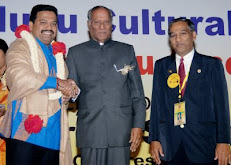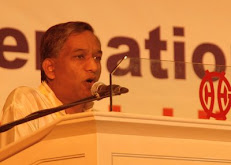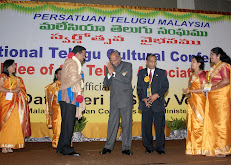Golden Era of Telugu LiteratureSrikrishnadevarayalu (Krishnarayalu) (1509-1529) of Tuluva dynasty was the greatest emperor of Telugu people in the history of South India.
He ascended to the throne of Vijayanagara Empire in May 1509. The present Rayalaseema (The land of Krishnarayalu) of Andhra Pradesh forms the core of Krishnarayalu’s Empire. Emperor Krishnarayalu and his Prime Minister Timmarusu firmly established the authority of Vijanagara Empire all over South India by crushing Gajapati kings of Orissa , and the combined Muslim forces of Golconda (Hyderabad) and Bijapur that were waging Jihad on Telugus. He defeated Gajapatis of Orissa and liberated Andhra in five campaigns, Udayagiri, Kondavidu, Vijayawada, Rajamundry and finally Cuttack, the capital of Orissa. He defeated the Golconda army and captured its commander Madurul-Mulk, crushed Bijapur by defeating Ismail Adil Shah and restored Bahmani kingdom to Muhammad Shah. He established friendly relations with Portuguese, who set up a Portuguese Dominion of India in Goa in 1510. The Emperor obtained guns and Arabian horses from the Portuguese merchants. He also utilized the Portuguese expertise in improving water supply to Vijayanagaram City.
Emperor Krishnarayalu was not only a great warrior and administrator, but also an accomplished poet. As a patron of art and Telugu literature he was unsurpassed in the history of Telugus. He wrote Amuktamalyada, a ‘prabandhamu.’ Prabandhamu is a variety of Telugu poetry which is mainly a narrative or a continued discourse. Often sensuality (sringaramu) dominates in Prabandhas. In Amuktamalyada, Emperor Krishnaraya beautifully describes the pangs of separation suffered by Godadevi (the human incarnation of mother Earth, the wife of Lord Vishnu) for her lover Lord Vishnu. He describes Godadevi’s physical beauty in thirty verses. Even the descriptions of spring and monsoon seasons add to the strength of sensuality. The sensual pleasure of union extends beyond the physical level and becomes a path to the spirituality and ultimate union with the lord Vishnu leading to Moksha, a state of being unity with God. Here Godadevi represents the humanity and her longing for Lord Vishnu (the Ultimate Supreme God) is the humanity’s search for Moksha and divinity. One of the main characters in this ‘prabandhamu’ is Vishnuchittudu, the father of Godadevi. Lord Vishnu commands Vishnuchittudu to teach King of Pandya Dynasty the path of knowledge to Moksha. There are several short tales described in Amuktamalyada in the course of the main story of Godadevi, e.g., narration of Khandikhya-Kesidvaja, Maladasari, Yamunacharya, Chandala-Brahmarakshasa Vivadamu-the argument between chandala (outcaste) and brahmarakshasa (spirit of a Brahmin), etc. The main purpose of this prabandhamu is to spread the Vaishnavite religion and the path of knowledge. Emperor Krishnarayalu was also well-versed in Sanskrit and Kannada languages. “Jambavati Kalyanamu” is his Sanskrit work.
Krishnarayalu’s reign was the golden age of Telugu literature, and is comparable to the Pariclean age of Greece and Elizabethan age of England. Eight poets known as ‘Astadiggajalu’ (eight elephants in the eight cardinal points such as North, South etc.) decorated his court known as ‘Bhuvanavijayamu.’ According to the Vaishnavite religion there are eight elephants in eight corners in space and hold the earth in its place. Similarly these eight poets were eight pillars of his literary assembly. These Astadiggajas were: Allasani Peddana, Nandi Timmana, Madayyagari Mallana, Dhurjati, Ayyalaraju Ramambhadrudu, Pingali Surana, Ramarajabhushanudu, and Tenali Ramakrishnudu.
Among these eight poets Allasani Peddana is considered to be the greatest and is given the title of ‘Andhra Kavita Pitamaha’ (the father of Telugu poetry). Manucharitramu is his popular prabandha work. Paddana dedicated this prabandha to Emperor Krishnarayalu. Nandi Timmana wrote ‘parijataapaharanamu’ and dedicated it to the Emperor. Madayyagari Mallana wrote ‘Rajasekhara Charitramu.’ Dhurjati wrote Kalahasti Mahatyamu and Ayyalraju Ramabhadrudu wrote ‘Ramaabhyudayamu.’ Pingali Surana wrote “Raghavapandaveeyamu,’ a dual work with double meaning, a novel experiment in Telugu literature. This work describes both Ramayanamu (story of Lord Rama) and Bharatamu (story of Pandavas). Battumurty alias Ramarajabhushanudu wrote “Kavyalankarasangrahamu,” “Vasucharitramu,” and “Harischandranalopakhyanamu.” Among these works the last one is a dual work which tells simultaneously the story of King Harischandra and King Nala. Tenali Ramakrishnudu (he changed his family name from Garlapati based on his family residency in Tenali City) first wrote ‘Udbhataradhya Charitramu,’ a Shaivite work. However, he converted to Vaishnavism later and wrote Vaishnava devotional texts “Panduranga Mahatmyamu,” and “Ghatikachala Mahatmyamu.”
The period of Vijayanagra Empire is known as “Prabandha Period,” because of the prabandha literature produced during this time. Among the various Telugu rulers of this period, Emperor Krishnarayalu’s rule is outstanding and is known as the Golden Age of Telugu Literature. Vijayanagara Empire was founded in 1336. The fall of the empire began in 1565 with the war of Tallikota (or Rakshasi Tangadi). The period from 1336 through 1565 is considered to be one of the best periods in the Andhra history. The fall of the empire started during the period of Aliya (Araveeti) Ramarayalu, son-in-law of Emperor Tuluva Krishnarayalu. Ramarayalu removed many Brahmin governors who were faithful to Tuluva family. He also recruited thousands of Muslims into his army. During the war of Tallikota, in which Ramarayalu was fighting the combined Muslim forces of Golconda, Bijapur, Ahmednagar and Bidar, he was stabbed in the back and killed by his Muslim generals and troops. However, Araveeti dynasty continued for another hundred years from Penugonda as capital. The Vijayanagara dynasty slowly died as the smaller kingdoms declared independence and Telugu people remained divided and ruled by Muslims and British until the present state of Andhra Pradesh was formed in 1956, beginning the modern history of Telugus as part of the Indian Union.
Domingos Paes, a Portuguese merchant who lived in Vijayanagaram City (1520-22) described Emperor Krishnarayalu: “… He is the most feared and perfect king that could possibly be, cheerful of disposition and very merry, he is one that seeks to honor foreigners, receives them kindly…. He is a great ruler and man of much justice….”
Sreenivasarao Vepachedu, May 7, 2000
Emperor Krishnarayalu was not only a great warrior and administrator, but also an accomplished poet. As a patron of art and Telugu literature he was unsurpassed in the history of Telugus. He wrote Amuktamalyada, a ‘prabandhamu.’ Prabandhamu is a variety of Telugu poetry which is mainly a narrative or a continued discourse. Often sensuality (sringaramu) dominates in Prabandhas. In Amuktamalyada, Emperor Krishnaraya beautifully describes the pangs of separation suffered by Godadevi (the human incarnation of mother Earth, the wife of Lord Vishnu) for her lover Lord Vishnu. He describes Godadevi’s physical beauty in thirty verses. Even the descriptions of spring and monsoon seasons add to the strength of sensuality. The sensual pleasure of union extends beyond the physical level and becomes a path to the spirituality and ultimate union with the lord Vishnu leading to Moksha, a state of being unity with God. Here Godadevi represents the humanity and her longing for Lord Vishnu (the Ultimate Supreme God) is the humanity’s search for Moksha and divinity. One of the main characters in this ‘prabandhamu’ is Vishnuchittudu, the father of Godadevi. Lord Vishnu commands Vishnuchittudu to teach King of Pandya Dynasty the path of knowledge to Moksha. There are several short tales described in Amuktamalyada in the course of the main story of Godadevi, e.g., narration of Khandikhya-Kesidvaja, Maladasari, Yamunacharya, Chandala-Brahmarakshasa Vivadamu-the argument between chandala (outcaste) and brahmarakshasa (spirit of a Brahmin), etc. The main purpose of this prabandhamu is to spread the Vaishnavite religion and the path of knowledge. Emperor Krishnarayalu was also well-versed in Sanskrit and Kannada languages. “Jambavati Kalyanamu” is his Sanskrit work.
Krishnarayalu’s reign was the golden age of Telugu literature, and is comparable to the Pariclean age of Greece and Elizabethan age of England. Eight poets known as ‘Astadiggajalu’ (eight elephants in the eight cardinal points such as North, South etc.) decorated his court known as ‘Bhuvanavijayamu.’ According to the Vaishnavite religion there are eight elephants in eight corners in space and hold the earth in its place. Similarly these eight poets were eight pillars of his literary assembly. These Astadiggajas were: Allasani Peddana, Nandi Timmana, Madayyagari Mallana, Dhurjati, Ayyalaraju Ramambhadrudu, Pingali Surana, Ramarajabhushanudu, and Tenali Ramakrishnudu.
Among these eight poets Allasani Peddana is considered to be the greatest and is given the title of ‘Andhra Kavita Pitamaha’ (the father of Telugu poetry). Manucharitramu is his popular prabandha work. Paddana dedicated this prabandha to Emperor Krishnarayalu. Nandi Timmana wrote ‘parijataapaharanamu’ and dedicated it to the Emperor. Madayyagari Mallana wrote ‘Rajasekhara Charitramu.’ Dhurjati wrote Kalahasti Mahatyamu and Ayyalraju Ramabhadrudu wrote ‘Ramaabhyudayamu.’ Pingali Surana wrote “Raghavapandaveeyamu,’ a dual work with double meaning, a novel experiment in Telugu literature. This work describes both Ramayanamu (story of Lord Rama) and Bharatamu (story of Pandavas). Battumurty alias Ramarajabhushanudu wrote “Kavyalankarasangrahamu,” “Vasucharitramu,” and “Harischandranalopakhyanamu.” Among these works the last one is a dual work which tells simultaneously the story of King Harischandra and King Nala. Tenali Ramakrishnudu (he changed his family name from Garlapati based on his family residency in Tenali City) first wrote ‘Udbhataradhya Charitramu,’ a Shaivite work. However, he converted to Vaishnavism later and wrote Vaishnava devotional texts “Panduranga Mahatmyamu,” and “Ghatikachala Mahatmyamu.”
The period of Vijayanagra Empire is known as “Prabandha Period,” because of the prabandha literature produced during this time. Among the various Telugu rulers of this period, Emperor Krishnarayalu’s rule is outstanding and is known as the Golden Age of Telugu Literature. Vijayanagara Empire was founded in 1336. The fall of the empire began in 1565 with the war of Tallikota (or Rakshasi Tangadi). The period from 1336 through 1565 is considered to be one of the best periods in the Andhra history. The fall of the empire started during the period of Aliya (Araveeti) Ramarayalu, son-in-law of Emperor Tuluva Krishnarayalu. Ramarayalu removed many Brahmin governors who were faithful to Tuluva family. He also recruited thousands of Muslims into his army. During the war of Tallikota, in which Ramarayalu was fighting the combined Muslim forces of Golconda, Bijapur, Ahmednagar and Bidar, he was stabbed in the back and killed by his Muslim generals and troops. However, Araveeti dynasty continued for another hundred years from Penugonda as capital. The Vijayanagara dynasty slowly died as the smaller kingdoms declared independence and Telugu people remained divided and ruled by Muslims and British until the present state of Andhra Pradesh was formed in 1956, beginning the modern history of Telugus as part of the Indian Union.
Domingos Paes, a Portuguese merchant who lived in Vijayanagaram City (1520-22) described Emperor Krishnarayalu: “… He is the most feared and perfect king that could possibly be, cheerful of disposition and very merry, he is one that seeks to honor foreigners, receives them kindly…. He is a great ruler and man of much justice….”
Sreenivasarao Vepachedu, May 7, 2000



.jpg)
.jpg)
.jpg)
.jpg)
.jpg)


No comments:
Post a Comment